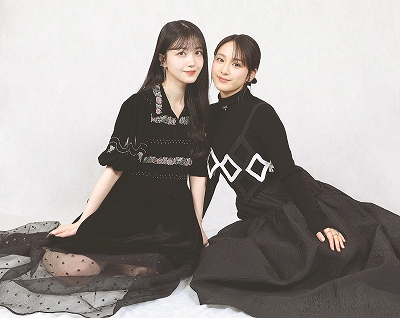
Shiori Kubo, left, and Yuna Taira
12:00 JST, April 4, 2025
Based on Masakazu Ishiguro’s hit manga, the film “Nemurubaka -Hypnic Jerks-,” released in theaters on March 20, depicts two young women who live a cozy life in a college dormitory for female students and are about to go their separate ways.
Despite each having different adolescent worries, there is a laid-back atmosphere as the two live through a period where they have few responsibilities, giving the film a somewhat nostalgic touch.
The film depicts Yumi Irisu (Shiori Kubo) and her older roommate Ruka Kujirai (Yuna Taira). While Irisu has nothing to devote herself to, Ruka is chasing her dream while playing in a band. Together, they drink at a cheap izakaya pub and watch old foreign dramas to pass the time. However, this routine is disrupted when Ruka is contacted by a major record company.
The film was directed by Yugo Sakamoto, whose “Baby Walkure” (“Baby Assassins”) series also got a lot of buzz.
Although this film marked the first time Kubo and Taira had acted together, the two have already become close friends, calling each other “Tai-chan” and “Shi-chan” when The Yomiuri Shimbun conducted an interview with them.
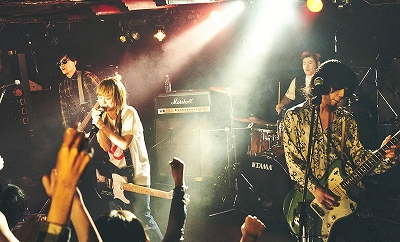
Ruka (Yuna Taira), second from left, plays guitar and sings in an indie band at a concert.

Irisu (Shiori Kubo), left, works part-time at a used bookstore with a slightly problematic colleague named Nakazaki (Usagi from the comic duo Long Coat Daddy).
The following is excerpted from the interview.
The Yomiuri Shimbun: What do you think of the original manga?
Shiori Kubo: I read it after I was cast in the film and fell in love with its world so much that I was afraid to act in it. It was a new feeling for me. I felt that all the characters were searching for something. As I haven’t experienced college life, I was envious.
Yuna Taira: I had a deep affection for the two protagonists, who were both struggling in their own ways.
Yomiuri: The two contrast with one another. Irisu is not able to find what she wants to do, while Ruka is devoted to music through her band activities.
Taira: Ruka is cool as she is so single-minded. I wanted to play a role that would change my image as an actor, so I immediately thought, “I would like to play this!”
Kubo: Compared to Ruka, Irisu lives a low-profile life, and she is looking for something to make her life more exciting. However, she never lets it get her down. Rather than being worried and introverted, she somehow accepts her situation. That’s so appealing.
Taira: I think Ruka recognizes Irisu. For Ruka, Irisu must appear to shine very bright.
Quickly becoming friends
Yomiuri: How did you feel about each other when you first met?
Taira: We met for the first time at a script reading session just for two of us. She was so quiet that I thought we wouldn’t become friends.
Kubo: I felt the same way! When we first met, she suddenly put her hand on my shoulder and asked me the brand name of the hoodie I was wearing. I also thought we wouldn’t become friends.
Taira: Did I do that? I don’t remember.
Kubo: I’m so shy that I often shut the door tightly to people I don’t know well. But Tai-chan was always actively communicating with me. After the film shooting started, we quickly became good friends.
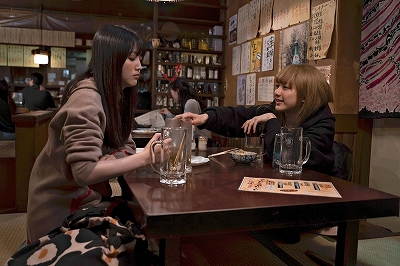
Irisu (Shiori Kubo), left, and Ruka (Yuna Taira) drink together at a cheap izakaya pub.
Yomiuri: Your good relationship is evident in the film. What was the most memorable scene for you?
Kubo: The scene where we are drinking together in an izakaya pub is one example. There were actually other actors around us, but I felt it was just the two of us in that special space. The director left the scene up to us. We didn’t have a discussion about the scene beforehand. A lot of the conversation and movements were spontaneous.
Taira: I have many fond memories of the women’s dormitory. We shot the dormitory scenes in only three days, and we were together from morning until night. I remember that it was during this time that not only Irisu and Ruka grew closer — we did as well.
Author depicts ‘college life that ends abruptly’
The Yomiuri Shimbun asked Masakazu Ishiguro, the author of the original manga, about his thoughts on the work, which has been selling well since it was first published in 2008.
The Yomiuri Shimbun: How did you get the idea for this story?
Masakazu Ishiguro: It was mainly what I had in mind when I was in university. I wanted to become a manga artist, and I was nervous and frustrated because of a sense of rivalry and my uncertain future. I was questioning whether or not I had any talent.
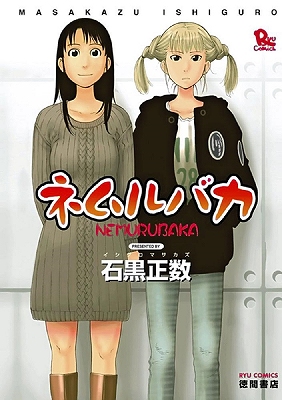
The cover of “Nemurubaka”
I lived in a student apartment building, and I had a good friend living on another floor there. We were always in each other’s rooms. But as graduation approached, my friend suddenly started looking for a job and preparing to move out, even though we had been playing just the day before. I realized that college life would end abruptly just like that. I wanted to depict that feeling.
Yomiuri: What did you think of the film?
Ishiguro: The atmosphere and characters were wonderfully re-created. I wanted to keep watching the interactions between the main characters played by Kubo-san and Taira-san in their dormitory life.
Yomiuri: What do you think now about the college life you depicted in the manga?
Ishiguro: I think it didn’t have to be that nervous and frustrating. But I really felt like I myself was in such a tight corner. I don’t think I would have been able to make my debut as a manga artist or have any work serialized had I not had that feeling. I think what I depicted in the manga was true for me and it was necessary for me to experience college life.
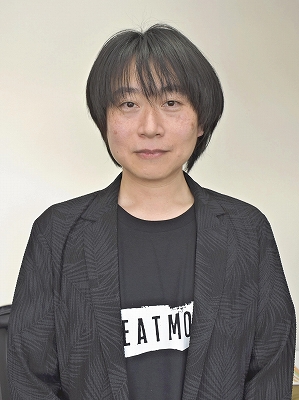
Manga artist Masakazu Ishiguro
I didn’t realize this when I created the work, but when I later read Soseki Natsume’s famous coming-of-age novel “Sanshiro,” I thought my work has something in common with it. I realized that the manga and the novel shared some universal themes.
Masakazu Ishiguro
Masakazu Ishiguro made his debut as a manga artist in 2000 and has gone on to create many popular works including “Soredemo Machi wa Mawatteiru” (And yet the town moves) as well as “Nemurubaka.” His work, “Tengoku-Daimakyo” (“Heavenly Delusion”), is currently being serialized in the Gekkan Afternoon monthly magazine published by Kodansha Ltd.
Top Articles in Culture
-

BTS to Hold Comeback Concert in Seoul on March 21; Popular Boy Band Releases New Album to Signal Return
-

Lifestyle at Kyoto Traditional Machiya Townhouse to Be Showcased in Documentary
-

Director Naomi Kawase’s New Film Explores Heart Transplants in Japan, Production Involved Real Patients, Families
-

‘Jujutsu Kaisen’ Voice Actor Junya Enoki Discusses Rapid Action Scenes in Season 3, Airing Now
-
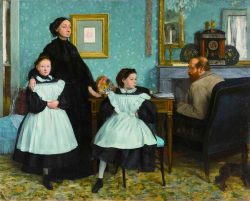
Tokyo Exhibition Offers Inside Look at Impressionism; 70 of 100 Works on ‘Interiors’ by Monet, Others on Loan from Paris
JN ACCESS RANKING
-

Japan PM Takaichi’s Cabinet Resigns en Masse
-

Japan Institute to Use Domestic Commercial Optical Lattice Clock to Set Japan Standard Time
-

Israeli Ambassador to Japan Speaks about Japan’s Role in the Reconstruction of Gaza
-

Man Infected with Measles Reportedly Dined at Restaurant in Tokyo Station
-

Videos Plagiarized, Reposted with False Subtitles Claiming ‘Ryukyu Belongs to China’; Anti-China False Information Also Posted in Japan























